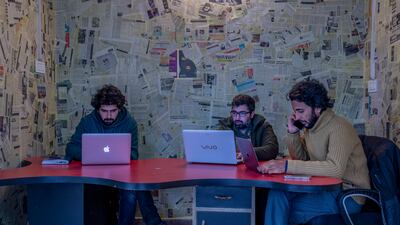Indian authorities have blocked the website and social media handles of an online news group based in Kashmir, the latest in a continuing crackdown on press freedom in the disputed region after it was brought under New Delhi’s direct rule.
Human rights groups and media organisations have accused Prime Minister Narendra Modi's government of stifling press freedom in the region after New Delhi stripped it of its limited autonomy and turned it into a federally run territory in August 2019.
The Kashmir Walla, an independent news website based in Srinagar, said its site and social media handles were blocked in India at the weekend.
“On Saturday, August 19, 2023, we woke up to another deadly blow of finding access to our website and social media accounts blocked,” it said in a statement.
“When we contacted our server provider on Saturday morning to ask why thekashmirwalla.com was inaccessible, they informed us that our website has been blocked in India by the Ministry of Electronics and Information Technology under the IT Act, 2000.”
Users in India were unable to access the website, while social media handles were displaying “@tkwmag's account has been withheld in India in response to a legal demand”.
The news outlet’s interim editor Yashraj Sharma said the government had neither sent them any notice nor any reason for the censorship.
“Next, we discovered that our Facebook page – with nearly half a million followers – had been removed,” he said.
There was no government response to the move.
The ban on the portal comes 18 months after its founding editor Fahad Shah was arrested on “terrorism charges”, following his coverage of a gunfight.
Authorities have accused him of “glorifying terrorism, spreading fake news and inciting violence”.
He is facing at least four other charges, including one for publishing an opinion piece 11 years ago on the website that prosecutors said was a work of “narrative terrorism”.
Mr Shah remains in custody, despite being granted bail in some of the cases, under the Unlawful Activities (Prevention) Act, or Uapa, that gives police sweeping powers to hold, question and search properties without a judicial mandate.

One of the portal’s trainee reporters Sajad Gul was also arrested in January last year under the Public Safety Act – an administrative detention law that gives authorities the power to imprison anyone without charge.
Media groups in India have condemned the censorship, saying it is meant to intimidate journalists and curb their freedom in the conflict-ridden Himalayan valley.
“Yet another shameful act of censorship & muffling of Kashmiri voices. Normalcy isn’t about non-Kashmiris being able to buy chalets in Gulmarg. Amit Shah, normalcy is about ordinary Kashmiris being able to walk, work, speak & live freely as Indians,” Anuradha Bhasin, the editor of the Kashmir Times news portal wrote on X, formerly Twitter.
“Fahad Shah, the founder of Kashmir Walla, has been behind bars for almost two years. Other Kashmiri journalists are being intimidated, jailed – their passports are being suspended. The feel-good Kashmir story,” said Rana Ayyub, a journalist.
Dozens of journalists, activists, politicians, intellectuals and ordinary citizens have been charged in recent years over alleged anti-India ideologies – and over what many regard as draconian laws.
As many as six journalists are behind bars in India, charged under the stringent Uapa. Four are from the restive Kashmir region, including Mr Shah, according to the Committee to Protect Journalists, an international NGO.
“This opaque censorship is gut-wrenching,” a statement by Ms Sharma read. "There isn’t a lot left for us to say any more. Since 2011, The Kashmir Walla has strived to remain an independent, credible and courageous voice of the region in the face of unimaginable pressure from the authorities while we watched it being ripped apart, bit by bit.
“The Kashmir Walla’s story is the tale of the rise and fall of press freedom in the region. Over the past 18 months, we have lost everything.”
In January last year, Mr Modi’s government shut down the Kashmir Press Club, which served as a space for journalists to work and defend media freedom in the valley.
New Delhi stripped the region of its limited autonomy in August 2019 and brought it under direct rule, claiming “it was correcting a historical wrong” and fighting a separatist insurgency.
One of the world’s most militarised regions is divided between India and Pakistan, with more than three decades of armed insurgency against New Delhi rule that has left tens of thousands dead.
But India has adopted an iron-fist policy following the 2019 move to crush any dissent in the region, with a sweeping crackdown against anyone critical of the state.
Last week Jammu and Kashmir Bank, the region’s leading semi-public bank, summarily sacked its chief manager for “the state’s security interests”, without holding any formal inquiry.
The move came after authorities had similarly dismissed three government employees last month over claims they posed a threat to the “integrity and sovereignty of the state”.
More than 50 government employees' have been dismissed since 2019 over similar charges.


